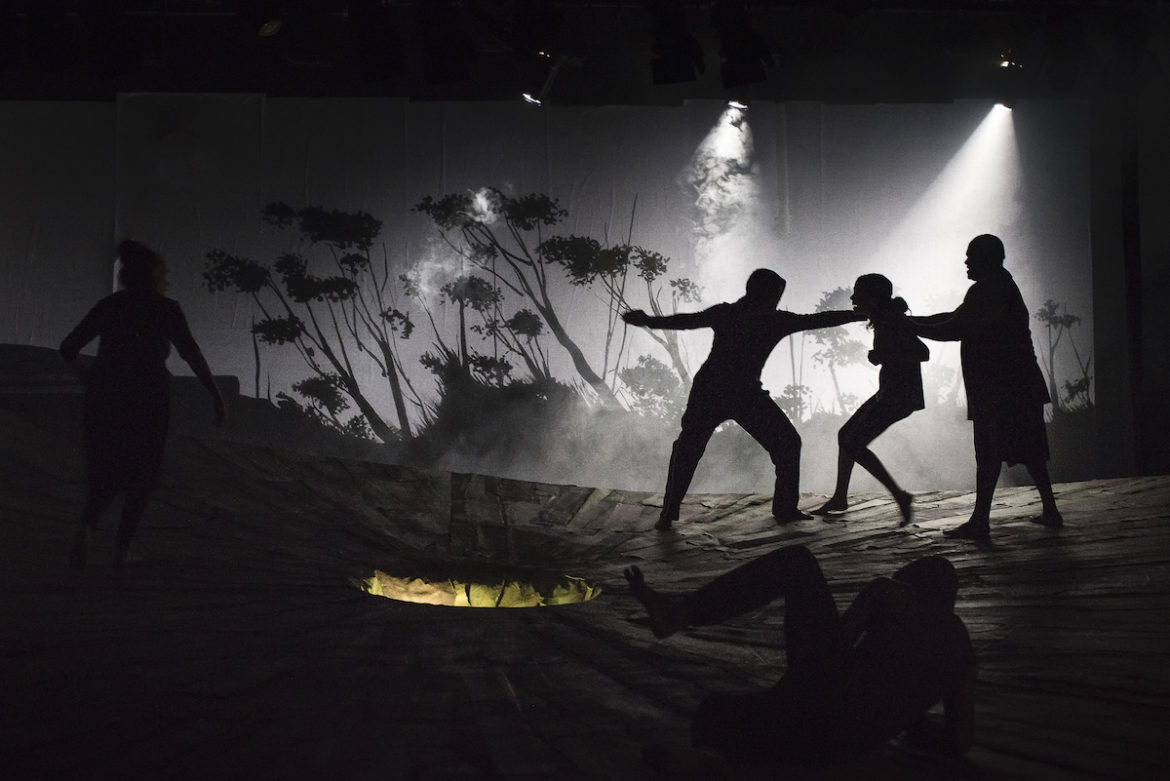Redefining two worlds: Monique Grbec on Yirra Yaakin’s inclusive vision in Hecate, their Noongar adaptation of Macbeth
How wonderful to be on Noongar boodja (Country) in 2020! Hecate, a Noongar language adaptation by Yirra Yaakin Theatre Company of Macbeth, subverts Shakespeare’s play by setting the drama on boodja.
Director and Noongar translator Kylie Bracknell focuses on Hecate as the goddess of Greek mythology who protects and brings prosperity, moving away from the 17th century characterisation that labels her as “the queen of witches”. The shift to matriarchal traditions and the techniques of Noongar storytelling make room for art, tenderness and a dash of romance.
Shakespeare’s violent psychological tragedy dramatises political ambition and gives us a glimpse of the 17th century England in which it was written, where patriarchal policies excluded women from voting, inheriting property or even performing on stage. The only acceptable ways for women to explore their ambition was through marriage, when they were no longer considered legal individuals.
There are no surtitles in this production so, unless you’re fluent in Noongar, some of the details and changes in the adaptation take a moment to process. But, as with the fluidity of Shakespearean poetics, the Noongar language and performance traditions have a fascinating magnetism that hold the audience in the moment. When Hecate (Della Rae Morrison), for example, berates the mischief-makers for stirring up trouble, the Shakespearian lineage is not broken. In every culture, in every land, in every time, there are meddlers who find pleasure in creating drama.
The performance opens with Hecate, the matriarch of ancient knowledge, as she rises from the earth and calls to the red light of a fire burning in a pit in the centre of the stage. Bird cries, the calling wind and a visceral heartbeat embody Noongar boodja. As with the poetry of Shakespeare, the Noongar language – along with gestural storytelling that employs the actors’ faces, eyes and hands – manifest trouble. Our boodja is threatened. Dr Clint Bracknell’s brilliant sound design works to unite the whole production, bringing all the elements together as an image of inclusiveness.
‘Each time we see a falling star we know a new life is forming from an old soul, eventually returning to the sky when that life is “rounded by sleep”.’
The three creeping, sneaking mischief-makers appear with the fall of night, against a backdrop of the starry cosmos. While their movements are earthed, the characters are immediately recognisable as the witches of Shakespeare’s tragedy. The basic story as we know it unfolds.
The mischief makers tell Macbeth (Maitland Schnaars) that he will be king, and tell his best friend and fellow soldier Banquo (Trevor Ryan) that his heirs will be kings. Surviving a brutal battle, the men return home, and Macbeth and Lady Macbeth (Bobbi Henry – a master of non-verbal communication) unite in a sexy embrace. A plot is born to kill the king, and Banquo and his heirs, so the Macbeths can rule boodja.
A welcome change in this adaptation is that Banquo’s child is a daughter. Fleance, gracefully portrayed by Cezera Critti-Schnaars, is a gentle soul who spends her days studying and drawing the world around her, the birds, trees, skies and elements. Escaping the fate of her father, Fleance will fulfil the prophecy when she is crowned. This makes for a satisfying realisation of Bracknell’s explanation of Noongar teachings that “all things in life are circular”: “Each time we see a falling star we know a new life is forming from an old soul, eventually returning to the sky when that life is ‘rounded by sleep’.”
I found Zoë Atkinson’s choice of wardrobe initally disrupting. All the characters aside from Hecate are clothed in a version of leisurewear – t-shirts, shorts, and leggings – which takes a moment to absorb. Is this their rehearsal gear, or have the cast plucked comfortable favourites from their wardrobes? Macbeth without uniforms? Royalty is signified by a tacky plastic crown with oversized plastic gems, and fluoro pink nametags garishly adorn at the banquet.
But once we settle into the story, the muted colours of the wardrobe blur into the landscape, and the soft fabric on stretching limbs is welcomed as a second skin. Even the crassness of the plastic crown and nametags highlight the fallibility of individualism.
From the initial vision of Yirra Yaakin’s artistic director, Kyle J Morrison, to the collective team of cultural leaders, performers, the Noongar community and Bell Shakespeare, this production unites past and present to offer us a thrilling glimpse of what it might look like if we redefined the path of colonisation.
At the final coronation, when Malcolm (Mark Nannup) tosses the king’s crown to the ground and calls for healing and collective strength. A fire illuminates boodjar and the audience stands, claps and woohoos. And there are tears for triumph and togetherness; tears for the privilege of witnessing the redefining of two worlds.
Hecate, directed and adapted from William Shakespeare’s Macbeth by Kylie Bracknell. Translators Kylie Bracknell and Dr Clint Bracknell. Language Editor and consultant Roma Yibiyung Winmar, Cultural consultants Judy Bone and Mitchella Hutchins. Set and Costume Design Zoë Atkinson. Lighting designer Mark Howett. Composer, musical director and sound designer Dr Clint Bracknell. Movement director Janine Oxenham. Performed by Cezera Critti-Schnaars, Della Rae Morrison, Bobbi-Jean Henry, Kyle J Morrison, Maitland Schnaars, Mark Nannup, Ian Wilkes. Trevor Ryan, Rubeun Yorshire. Yirramboi Yaakin Theatre Company in association with Bell Shakespeare at the Perth festival. Subiaco Arts Centre. Until February 16. Bookings

